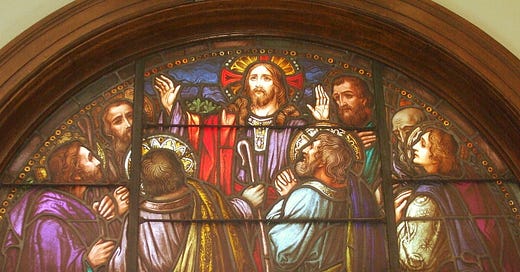Two Wrong Assumptions about the Great Commission
And Jesus came and said to them, "All authority in heaven and on earth has been given to me. Go therefore and make disciples of all nations, baptizing them in the name of the Father and of the Son and of the Holy Spirit, teaching them to observe all that I have commanded you. And behold, I am with you always, to the end of the age" (Matt 28:18–20).
- Jesus

Source. By Lyricmac. License. Before Jesus ascended into heaven, he commissioned his apostles. This commission, known now as the Great Commission, has greatly influenced how Christians conceive of the God's mission on earth. During the 18th century, many felt that this commission applied specifically to the Apostles, and not to everyday believers. William Carey responded this assumption by asserting the universal application of the great commission. Carey's pioneering vision for missions previewed the great flourishing of missions that would soon follow and whose influence is still felt today. While Christians today affirm that Jesus' Great Commission applies to all believers, believers sometimes misunderstand the nature of the commission. The Great Commission has become so common and familiar that its message is often assumed to be something that is not, and this happens in at least two ways.
When We See the Great Commission as Only about Conversions
One common assumption is that the great commission equals evangelizing someone without aiming to make a life-long disciple out of that person. If we think that by sharing the Gospel once with a friend that we have fulfilled Jesus' command, then we've made a mistake. The great mission entails making disciples, baptizing them, and teaching these disciples all that Christ has commanded the apostles. Re-read Matthew 28:18–20. Making disciples of someone and teaching them all Jesus' commanded the apostles takes a lifetime (and more!). In effect, if you share the Gospel with someone without at least aiming to make that person a disciple, then you have not wholly participated in the Great Commission. To be clear, you should share the Gospel with anyone and at any time, even though it may be impossible for you to disciple that man or woman personally. The Great Commission is a major purpose of the church, and so sharing the Gospel with someone on a plane ride and recommending an evangelical church is something that you can and should do. The point is that the Great Commission entails more than only sharing the Gospel at one time without the goal of enlisting that person as a life-long disciple. You don't have to do everything, but you can, for example, direct a person to a church (if possible) to fulfill the great commission.
When We See the Great Commission As Only for Individuals
The Great Commission is not only an individual endeavor. Actually, it is primarily a corporate mission. Christians learn all that Jesus taught the apostles through involvement in the local church. This is why expository preaching particularly fulfills the great commission. Pastors who preach week by week the biblical text are fulfilling the great commission. In the same way that pastors fulfill the great commission, so also do congregants who engage in personal evangelism participate in it. Equally, moms who teach their children how to grow up in the Lord are participating in the great commission. And so does anyone who engages in discipleship. The great commission involves equipping others to learn and live all that Jesus taught the apostles. Churches, moms, pastors, and anyone else who aims to guide people into the knowledge of Jesus and his word are fulfilling the great commission. Fixating on individual evangelism as the only way to fulfill the great commission minimizes the vital role that expository preaching and godly moms (among types of people!) play in obeying Jesus' command.
Conclusion
The great commission has inspired generations to cross oceans to share the Gospel of Jesus Christ. But some misunderstandings have tamed the comprehensive command of Jesus. Christians are called to not only evangelize a person once but to evangelize that person for a lifetime. This life-time discipleship involves the whole community of faith, the church.





